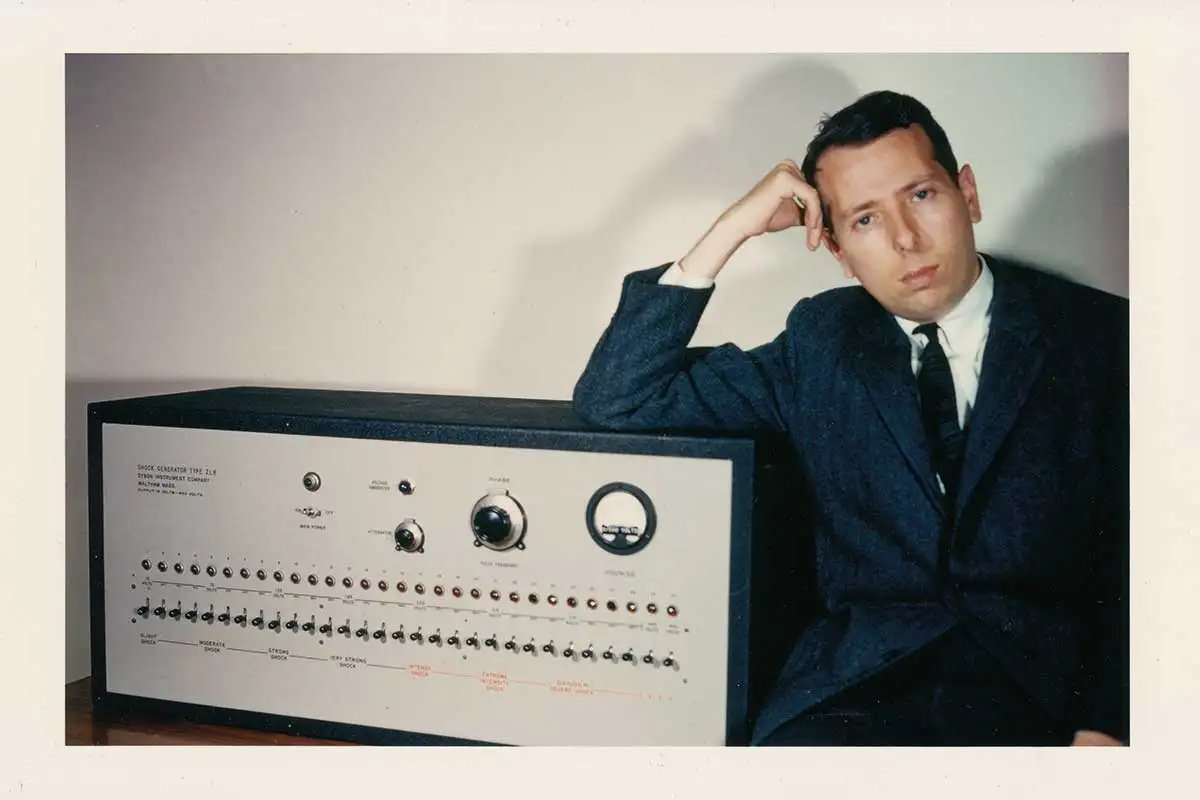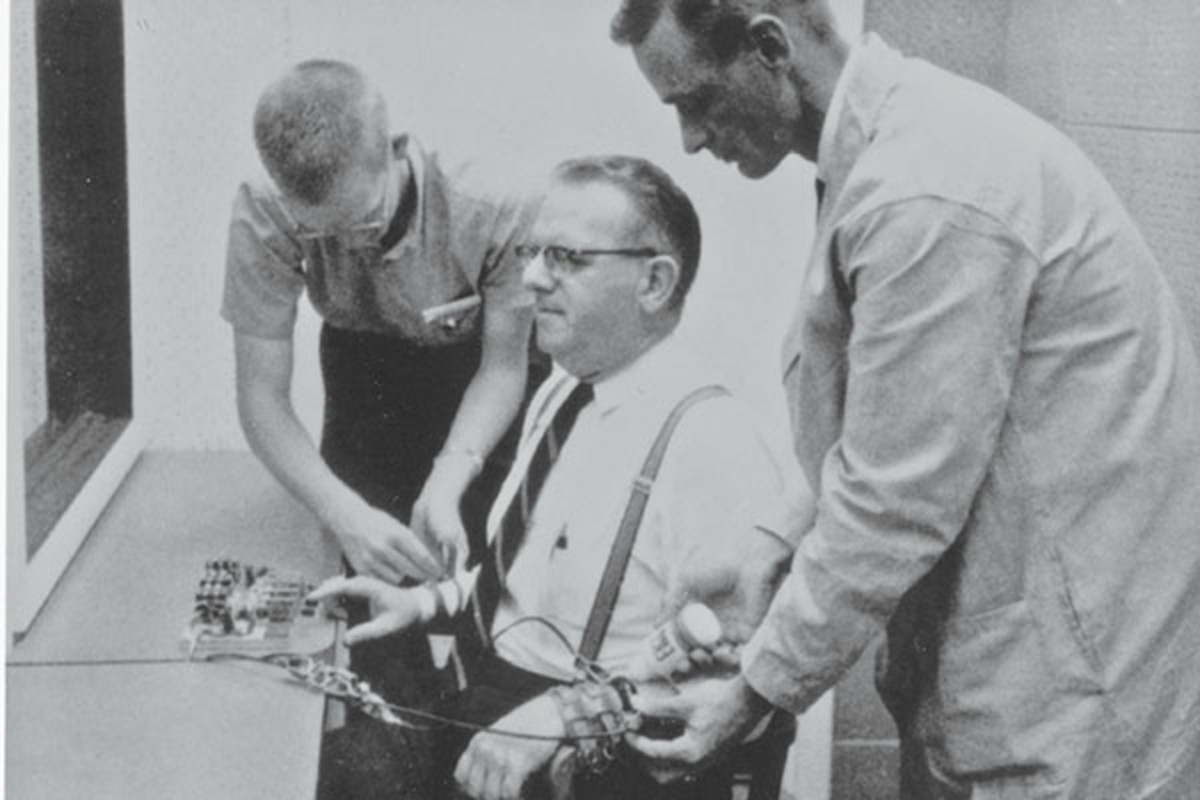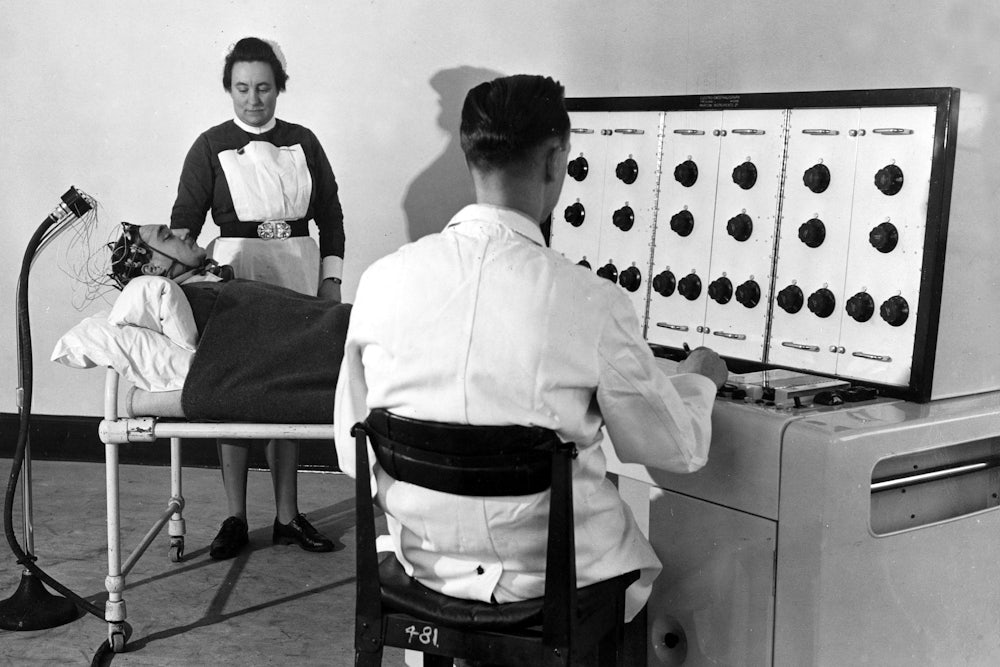Why Was Milgram Experiment Controversial
Di: Samuel
These results offer e compelling yet disturbing been so off power ok authority her obedience. One if this is the method of his study which is deception.The Stanford Prison Experiment, also known as the Zimbardo Prison Experiment, went on to become one of the best-known (and controversial) in psychology’s history.So why does Milgram’s experiment maintain such a powerful hold on our imaginations, even decades after the fact? Perry believes that despite all its ethical issues and the problem of never truly being able to replicate Milgram’s procedures, the study has taken on the role of what she calls a “powerful parable.The Little Albert Experiment is one of the most well-known and controversial psychological experiments of the 20th century. Joseph Dimow was one of the people who unknowingly took part in that experiment.

For instance, the teacher’s proximity to the learner was an important factor in lowering obedience, that is, the proportion of people willing to deliver the full 450 volts. They are a staple . The Milgram obedience experiment was the first and most infamous study on the authority bias, and involved asking people to administer painful and potentially harmful electric shocks to another person.Autor: Brooke Miller
Stanley Milgram’s Obedience Experiment
CHAPTER 10 Why Are the Milgram Obedience Experiments Still So Extraordinarily Famous— and Controversial? Arthur G. Even after his experiments, subjects were not debriefed and the purpose of the study was not explained. His parents and many of his other immediate and extended family members were deeply .The powerful ability of those in authority to control others was demonstrated in a remarkable set of studies performed by Stanley Milgram (1963). The researchers deceived participants into thinking they were shocking learners for giving wrong answers. The media have been obsessed with them since, repeatedly “re-discovering” them and re-reporting them as if they were amazing news. He was a 26-year-old assistant professor at Yale University with childhood memories of the war, such as gathering around the radio with his family in their Brooklyn . The Milgram experiment is the name for a number of controversial experiments in psychology. Ella Rhodes reports from a Stephen Reicher keynote at the Society’s Annual Conference in Nottingham. We followed Milgram’s .In 2010 I worked on a Dateline NBC television special replicating classic psychology experiments, one of which was Stanley Milgram’s famous shock experiments from the 1960s. In some of the best-known versions of the experiment, around 65% of people went on with the experiment despite the increasingly agonised cries from the ‘victim’.If they hesitated or tried to resist, a grey-coated experimenter instructed them to continue.Milgram’s experiment, conducted at Yale in the early 1960s, was one of the most controversial studies in the history of psychology and remains so today — 50 years since the experiment took place. Most participants continued to shock, despite the learners‘ screams and pleas.
Authority Bias: Lessons from the Milgram Obedience Experiment
The study has long been a staple in textbooks, articles, psychology classes, and even movies, but recent criticisms have called the study’s scientific merits and value into . In 1920, American psychologist John B.Why used the Milgram experiment how controversial? This Milgram experiment was controversial because a revealed people’s preparedness to obey authorty figures even once bewirken impair to others, raising ethical concerns about one psychiatric distress inflicted upon participants and the deception involved in the choose. The first issue was that Milgram used deception; he .During edu 1960s, Yale University psychologist Stanley Milgram conducted n series nd obedience experiments then led ok okay surprising results.For his experiments, Milgram created three roles: a researcher, teacher and student.The Stanley Milgram experiment is one of the most famous and controversial studies in the history of psychology. Critiques of the Study.The Milgram Experiment was also quite controversial, and considered by many scientists to be unethical and physically or psychologically abusive, motivating more thorough review boards and committee reviews for research with human subjects.
Stanley Milgram
We decided to take a closer look at the statistical claims of Milgram’s research by revisiting his papers and data related to the obedience experiments in the archives at Yale University .The main take-away from the Milgram experiment, from an ethical standpoint, was the psychological distress associated with coming face to face with your own capabilities as a destructive person.They were done by Stanley Milgram in the 1960s.The main experiment conducted by Milgram (1963) was designed to test the level of naive subjects’ obedience to authority.
Milgram Experiment Ethics
Stanley Milgram (born August 15, 1933, New York City, New York, U.
The shocking truth of Stanley Milgram’s obedience experiments
” Milgram’s work might not hold .Each experiment lasted about 50 min, and resulted in levels of agitation among some subjects that were unprecedented in previous psychological research.Milgram Experiment advertisement.Hier sollte eine Beschreibung angezeigt werden, diese Seite lässt dies jedoch nicht zu. Watson and his graduate student, Rosalie Rayner, carried out a study. Regardless of the subject type, the study would have resulted the same if only the real objective of the experiment . The results of this study aren’t particularly optimistic, . Thomas Blass, Milgram biographer and a professor of psychology at the University of Maryland Baltimore County, says that Milgram’s obedience experiments provided a powerful affirmation of one of the main guiding . However, psychology A-level students tend to be most familiar with his first published condition (see Milgram 1963), also referred to as the ‘baseline experiment’ (Jetten and .While at Yale, he conducted a seminal series of experiments on obedience to authority, which have come to be known simply as the infamous Milgram .He served on the faculty at Yale University, Harvard University, and the City University of New York. Williams’s directives to continue.
Milgram experiment
In conclusion, whilst there is no doubt that the experiment, in its original format, would not be allowed, it is important to remember that Stanley Milgram was not a bad person. He designed a study in which he could observe the extent to which a person who . It’s one of the most well-known psychology experiments in history – the 1961 tests in which social psychologist Stanley Milgram invited volunteers to take part in a study about memory and learning.
What Really Happened During The Milgram Experiment?
The subjects were told that the experiment tested the potency of punishment in improving learning capabilities, and were asked to administer electrical shocks to a “learner” (an accomplice of the experimenter).
The women who defied the Milgram Experiment
Milgram’s question was simply how far the teacher would continue to issue painful shocks before defying Mr. The Experiment The volunteer subject used a list of word pairs to play the role of “teacher” with another . During the study, volunteers were upset, and showed stress behaviors .The Milgram Shock Study took place over 50 years ago, and it is still considered one of the most controversial and infamous studies in modern history. Milgram was interested in understanding the factors that lead people to obey the orders given by people in authority.
Stanford Prison Experiment: Zimbardo’s Famous Study
However, its Milgram obedience experiment aimed or prove otherwise.Video ansehen4:21The Milgram Study reveals that most people obey authority, even if it means harming others. The Milgram studies tested how far people would go to obey authority, even when it meant hurting others.Yale University Manuscripts and Archives The Milgram experiment is still considered one of history’s most controversial psychology experiments. She contends that participants were prone to obey the experimenter because of the atmosphere of the . So when I participated in the simulation, I stopped administering the shock at the first sign of distress from the . Milgram’s study demonstrated with brutal clarity that ordinary individuals could be . Miller S ocial psychology textbook and journal authors, in introducing the subject of obedience, invariably describe the Milgram experiments as famous and controversial (emphasis added in all): “Understanding . The results seemed to plot a curve of compliant behavior, from the very top of society (wealthy, white, upper-class overachievers) to the lowest (unemployed, racially diverse school dropouts).In his experiment, a test subject was ordered . The study was conducted in the early 1960s, and it examined people’s willingness to .
Milgram’s Experiment on Obedience: Ethical Issues Essay

Milgram was inspired to design his experiments after Adolf Eichmann, one of the organizers of the Holocaust, was captured in 1960 by Israeli intelligence agents in .More though investigations cast .

Its actual aim, though, was to investigate obedience to authority – and Milgram reported that fully 65 percent of volunteers had .

As a result, we’re talking a lot about the Milgram shock experiment. Milgram conducted his highly influential and controversial obedience experiment while he was an assistant professor at Yale University. An experiment may produce only a restatement of the obvious or yield unexpected insights.The authority bias is a cognitive bias that makes people predisposed to believe, support, and obey those that they perceive as authority figures. Naive volunteers allocated the role of teachers in an experiment purportedly about the effect of punishment on learning were instructed to give a “learner” increasing levels of electric shock each time he failed to recall the correct . I actually did some research into it when we talked about it in my previous psychology class, and I found several conflicting sources.

Milgram’s studies remain hugely influential – and controversial.The Individual in a Social World: Quote Page 1. The student and the researcher were both secretly working for Milgram.Stanley Milgram’s obedience-to-authority experiments are undoubtedly the most famous research in social psychology. Baumrind argues that Milgram’s study of obedience did not meet ethical standards for research, because participants were subjected to a research design that caused undue psychological stress that was not resolved after the study.These groundbreaking and controversial experiments had—and continue to have—longlasting significance. Their goal was to explore the concept of classical conditioning.They might never agree to participate in research which is harmless or aimed to help the subjects if it was well known that researchers commonly use deception.These experiments laid the foundation for understanding why seemingly decent people could be encouraged to do bad things. Milgram’s critical finding was that 65 . The study even inspired made-for-TV movies! But not everyone praises Milgram for his boldness. The study subjects drew straws to determine whether they would be a teacher or student, but the draw was intentionally botched so that all of the subjects ended up being the teacher.In the 1960s, Milgram conducted an experiment designed “to see how far a person will proceed in a concrete and measurable situation in which he is ordered to inflict increasing pain on a protesting victim.Weitere Informationen Every experiment is a situation in which the end is unknown; it is tentative, indeterminate, something that may fail.The Milgram EXperiment became very controversial because of ethical issues.Stanley Milgram was riveted. A lot of them, usually scientific journals, cited it as a red letter psychological experiment, a turning point in the field of psychology .The Milgram experiment is one of the most controversial psychology experiments of the past century.—died December 20, 1984, New York City) American social psychologist known for his controversial and groundbreaking experiments on obedience to authority.
Why do we obey authority?
The reason behind Milgram’s idea to do such a controversial experiment is that both his mother and father were Jewish. In 2004, he described the experience: Standing in front of a keen psychology audience, Stephen Reicher (University of St Andrews) said he felt like he was at a primary school to tell children why Santa wasn’t real. This obedience is often justified by the Just World Phenomenon and the shedding of .Milgram expanded his initial research into a series of 19 experiments in which he carefully examined the conditions under which obedience would occur.Why (almost) everything you know about Milgram is wrong.
What can we learn from the Milgram experiment
I was familiar with it prior to accessing the simulation on the elearning site from an ABC television Four Corners episode on the nature of torture.Now, some of you are, most definitely, curious to know why Stanley Milgram was interested in conducting this particular type of research. Milgram wanted to find out how easy it was to get someone to follow orders, even if the orders went against their conscience. It was a controversial experiment that illustrates the conflict of obedience between authority and individual conscience.Milgram’s Obedience Experiment.The volunteers in Milgram’s experiment were traumatized, which is a major reason why this study was so ethically controversial. The indeterminacy of its outcome is part of its excitement. Milgram’s obedience experiments, in addition to other studies that he carried out during his career, generally .Despite no real physical harm to the participant nor the confederate, Milgram’s 1963 experiment broke the code of conduct in regard to what constitutes an ethical study in a number of ways, and if presented today, Milgram would likely not gain the approval to carry out his study in the first place.Milgram experiment on obedience.Milgram’s obedience experiments Milgram ran 24 experimental conditions manipulating variables such as the proximity of the participants to one another (see Perry 2013, 351–7). “He had a profound impact on the .
Why Is The Milgram Experiment So Controversial
The conclusion of Milgram’s experiment suggests That people’s nature of obeying often is either out of fear or out of desire so that they can appear cooperative even when their own thoughts or desire are mismatched. Inflicting severe or even fatal harm (real or perceived) can have a significant negative and lasting impact on a person’s view of themselves. “This was a landmark study in psychology and in Yale history,” said psychology professor Jack Dovidio.Stanley Milgram (August 15, 1933 – December 20, 1984) was an American social psychologist.
- Wie Ändere Ich Die Aktuelle Uhrzeit Auf Dem Aruba Switch?
- Why Should You Choose Super Mario Ringtones?
- Wie Alt Ist Pitbull _ Pitbull Terrier halten: Das sollten Sie beachten
- Why Do People Invest In Stocks
- Widmete Synonym : widmet
- Wie Alt Muss Man Für Eine Dampflok Mitfahren?
- Widerstandsnetz Physik – Widerstandsgesetz in Physik
- Wie Alt Ist Andri Andorra? , Frage zum drama Andorra
- Wicked Whims Mod Sims 4 Download
- Wie Aktualisiere Ich Mein Asus Live Update?
- Wie Alt Ist Der Größte Cashewbaum Der Welt?